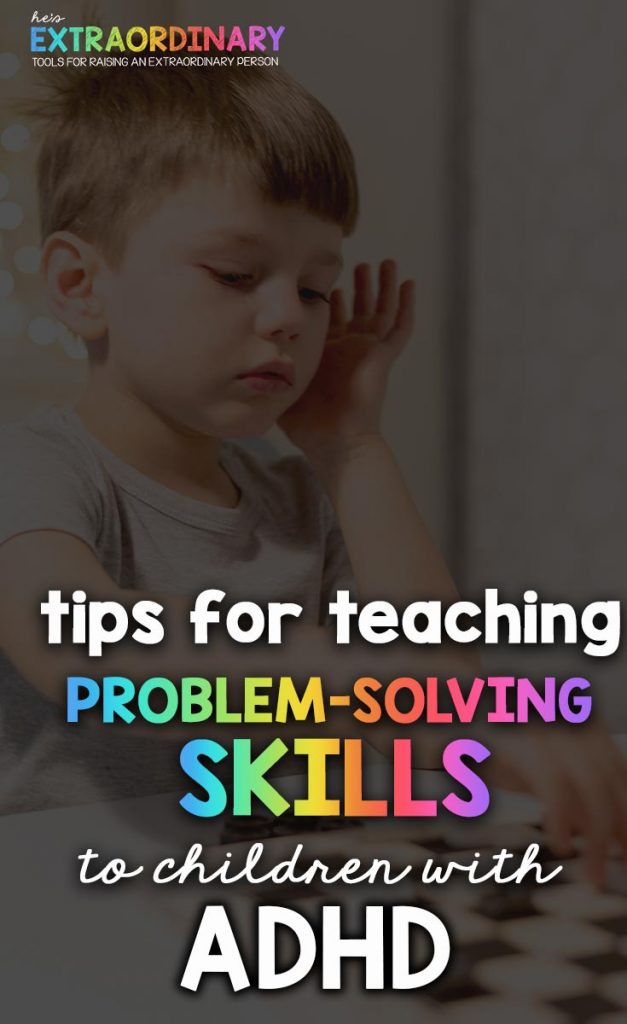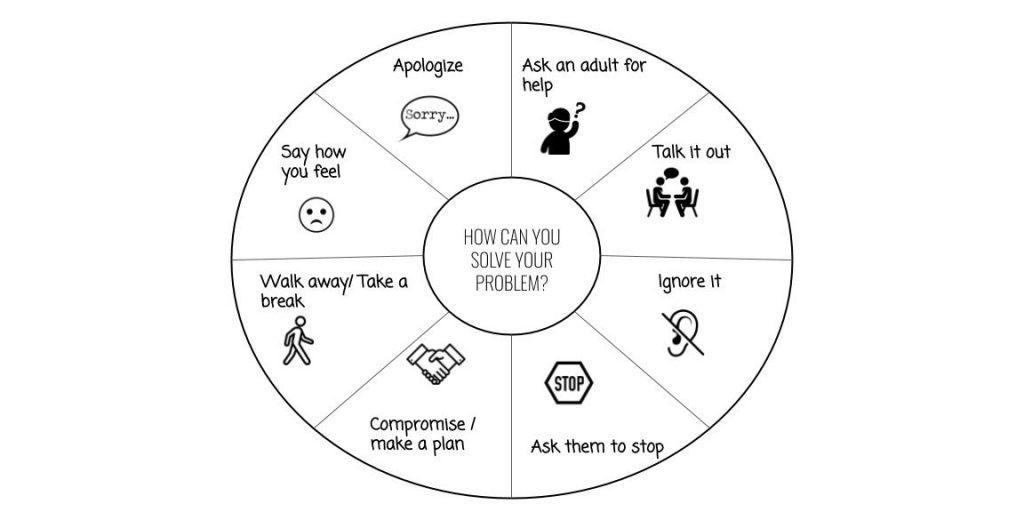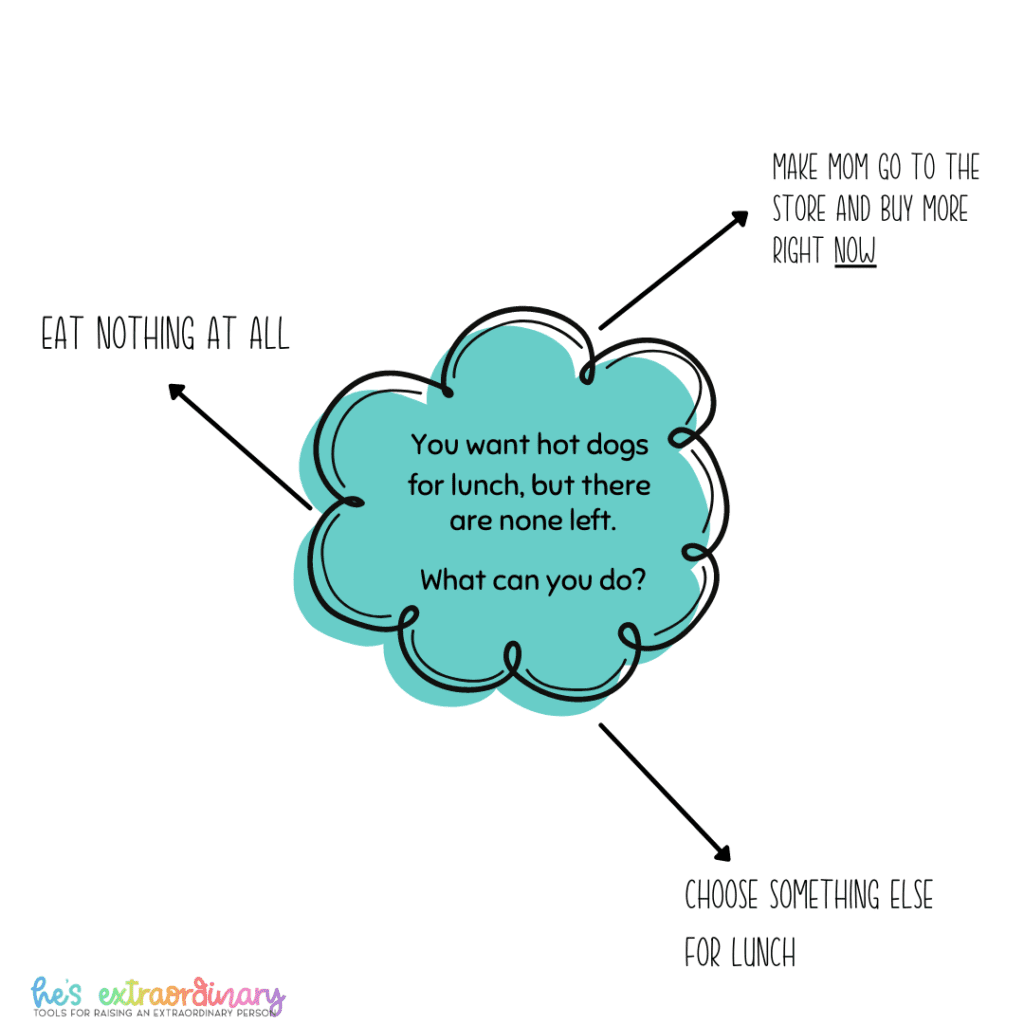How to Help Children With ADHD Develop Problem-Solving Skills
What’s inside this article: Background information as to why kids with both ADHD and autism struggle with developing problem-solving skills. Strategies you can use to help them develop better problem-solving skills, and board games that help them practice these skills.
Disclaimer: This post contains affiliate links
We don’t always see it as adults, but kids actually run into a lot of problems. Between arguing with siblings, disagreeing with parents’ rules, school work, balancing fun and responsibility, it’s tougher to be a kid than you think.
It seems there’s always some problem plaguing children. It might seem minor to your, but it isn’t to them. This is why we need to help them develop problem-solving skills.
It’s important for kids to learn how to problem-solve on their own because this is one of those critical life skills that they need.
Problem-Solving Skills & ADHD
Problem-solving skills are an executive function. Executive functions are the more complex functions of the brain.
This matters for children with ADHD because executive dysfunction is a hallmark ADHD symptom. In fact, kids with ADHD are, on average, 30% behind their peers when it comes to executive functioning.
To put that into perspective, if you have an 8-year-old, they probably only have the problem-solving skills of a typical 5-year-old. This becomes an issue because they may already struggle with social skills and now handling conflict with their peers is another challenge.
Spending extra time practicing problem-solving skills and other executive functions can help children with ADHD to develop these important life skills.
Set Realistic Expectations
Adjusting your current expectations, or knowingly setting realistic expectations for your child can help you see that your child is doing the best that they can.
As a parent, you can acknowledge this and help your child develop better problem-solving skills.
In the meantime, if your 8-year-old only shows the skill of a 5-year-old when they encounter a problem, you should assume they only currently have the ability of a 5-year-old. Set your expectations to match their current ability.
When your expectations are realistic, your children have more opportunities to be successful. This builds their confidence and helps them thrive.
How to Help Kids Develop Problem-Solving Skills
There are a number of ways you can help children “practice” their problem-solving skills, which over time helps them become more competent.
This involves both games that use their skills and also push them out of their comfort zone a little.
Start with games and situations in which your child will be highly successful. You want to begin by building their confidence so they will be more willing to try solving more challenging problems on their own later.
These strategies are helpful for all children but children with executive dysfunction may need extra time and practice to work on their skills.
Thinking of Possible Solutions
I took a training class on behavior intervention strategies and problem-solving skills were part of the discussion. The instructor said to us:
In order to problem-solve, you need to be able to come up with at least two possible solutions
This statement stuck with me. Kids with ADHD and autism often struggle with cognitive rigidity.
When it comes to problem-solving, cognitive rigidity could look like a child getting “stuck” on the first solution that comes to their head and seeing no other possible way to make a situation work.
For children, that first solution is often impulsive and probably not the best way to handle the situation.
So first of all, find out if your child can think of multiple solutions to issues, either independently or working collaboratively with you.
Brainstorm
Start with a brainstorming game. Write a “problem” in a bubble and then ask your child for different ways to handle it and write them down.
After you have a list, see if they can figure out what the “best” way would be to deal with their problem.
Start simple, or even begin with hypothetical problems about their favorite fictional characters.
For example:
In the example above, the most practical solution is to eat something else instead. But if your child gets “stuck” on things they may see no resolution because hotdogs are all that they will eat and will say they won’t eat until you go to the store and buy more.
If they aren’t able to see other possible solutions this may lead to an outburst or meltdown.
Regular practice with this brainstorming activity, especially hypothetical situations where their emotions aren’t involved, will help children to think about multiple solutions to their problems.
Ask Open Ended Questions
When your child is struggling with something, open-ended questions can help them think about things in a different way without you directly intervening and handling their problem for them.
Be that listening ear that your child needs while they work through these big feelings.
Games That Involve Problem-Solving
Strategy and board games often require a higher level of thinking that helps activate the problem-solving region of the brain, known as the prefrontal cortex.
For example, kids may strategically plan a couple of moves ahead in a board game but then need to problem-solve and adjust their strategy after their opponents’ turn.
There are board games for all skill sets and abilities so there’s definitely something out there that is developmentally appropriate for your child and you can work up to more challenging games over time.
Some games you can try include
Even though these games don’t include specific problems that your child is facing or may encounter, they still help.
The brain is moldable, so the more you practice using any type of problem-solving, the more connections form in the brain. With practice, this actually improves real-life problem solving too.

The Problem Solving Wheel
The problem-solving wheel is simply a wheel of generic solutions that may help your child solve their problems. This may be helpful if your child struggles to come up with possible solutions because it will prompt them to think about the situation in other ways.
You can use the problem-solving wheel for hypothetical situations, or through role-playing and pretend play scenarios, or as a way to prompt your child to work through their current problems independently.

Do Not Resolve Sibling Conflicts for Them
When siblings start to fight, perhaps over a toy, or which movie to watch, it feels natural as a parent to step in and handle it.
You decide who is right and who is wrong, or you dictate what the fair “compromise” will be. But, every time you intervene and solve this sibling conflict for them you are stealing away an opportunity for them to practice their problem-solving skills.
Instead, shift to the role of a mediator and guide them to solve their own problems.
For example, your kids are playing with Play-Doh together and you hear arguing. You look over and see them fighting over the same tool. There are a few ways this scenario plays out.
Or you can be their mediator.
Just say “I see that you both want to use that play-doh cutter right now and it’s pretty upsetting for both of you… What do you guys think would be a good idea so that everyone is happy playing with the play-doh?”
You would be surprised how often children will willingly suggest fair compromises when prompted instead of being told how to resolve their problems.
The child who would have thrown a fit and stormed away when you dictated they get the second turn will now be offering their brother the item happily.
Make sure you positively reinforce their problem-solving each time they are able to peacefully handle an issue on their own (or with your guidance).
Push Them To Make Choices on Their Own
Children who struggle to make choices also struggle to problem solve. Push your child to make their own choices as often as possible. From the small mundane ones to the somewhat larger choices. They need to be able to do this on their own.
If your child gets overwhelmed making broad decisions then offer options at first. For example, have them pick from two or three choices.
Your child needs to be confident in making their own choices in order to become confident at problem-solving
Let Them Experience The Natural Consequences
The next part of this equation is letting your child experience the natural consequences of their choices. Natural consequences are the inevitable result of your own actions.
If you shield your child from the natural consequence of a bad choice then they will never learn from that decision. The outcome of a poor choice is usually enough to teach your child without you needing to interfere. Just be there for them.
Don’t forget to praise your child for rising to the challenge and learning from their mistakes. Also, emphasize with them (I know how hard this is) Keep building them up, they need to know that mistakes and failures happen but it’s important to keep going.
More Skills
It’s normal for children with ADHD to require extra time and teaching when it comes to developing social-emotional skills like problem-solving.
Read this list: 38 skills kids need to be successful
You’ll find lots of other skills and teaching tips to help your child develop all the skills they need.
The Take-Away
There are a few key points I hope you took away from this guide.


